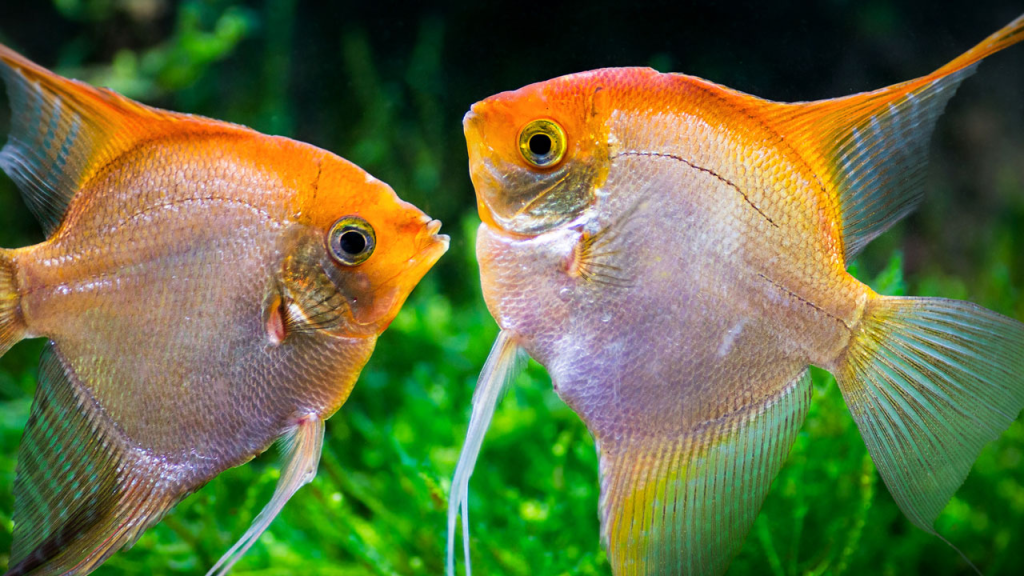How to calm down angelfish? Angelfish are a type of fish known for being aggressive and territorial. However, there are a few things you can do to calm them down. First, try adding more plants to their tank. This will give them something to hide behind and make them feel more secure. Second, make sure they have plenty of space to swim.
Why are my angelfish so aggressive?

There are a few reasons why your angelfish may be acting aggressively.
Lack of food
One possibility is that they’re not getting enough food. If you’re feeding them less than they need, they may become aggressive to get more food from you.
If your angelfish are acting aggressively, try increasing the food you’re giving them.
Establishing Dominance
If you’ve ever kept angelfish, you know that they can be a bit aggressive. Why are these gentle giants so aggressive? The answer has to do with establishing dominance.
In the wild, angelfish live in large groups. To assert their dominance and maintain their hierarchy, they engage in aggression. This is also true for captive angelfish.
Small Tank
If you have more than one angelfish in a small tank, you may notice them become aggressive towards each other. This is because they are territorial fish and need their own space. When they feel cramped, they will become aggressive to assert their dominance. Angelfish need plenty of space to swim and explore; if they feel cramped or crowded, they may start acting out.
Overcrowded Tank
If your angelfish constantly fight and seem aggressive, it could be due to an overcrowded tank. Angelfish are territorial fish and need their own space. When they don’t have enough room, they become stressed, leading to aggression.
To avoid this, make sure your tank is big enough for the number of angelfish you have. A good rule of thumb is at least 20 gallons per fish. It’s also essential to provide plenty of hiding places to escape from each other if needed. If your tank is overcrowded, you may need to remove some fish.
Incompatible Tankmates
Angelfish are aggressive toward both conspecifics and other tank mates. This aggression is often due to incompatible tank mates. If the fish in your tank are not of similar size or temperament, your angelfish may become stressed and act out. Here are a few tips on how to avoid this aggression in your tank:
- Avoid keeping angelfish with smaller fish- they will likely become meals for your angels.
- Choose tank mates that are of similar size and temperament. Angelfish can be shy, so pairing them with more aggressive fish may cause undue stress.
- Be sure to provide plenty of hiding places in your tank-angelfish like to have a lot of places to hide away from their tank mates.
Spawning and Breeding
When it comes to Spawning and Breeding, many aquarium fish keepers find that their angelfish can become quite aggressive. This is usually due to the fact that the female fish are trying to protect their eggs or fry from other fish in the tank. While this aggression is mainly seen during Spawning and Breeding season, it can also happen at other times as well.
There are a few things that you can do to try and reduce the aggression in your angelfish, but it is important to remember that this is natural behavior, and there is no guarantee that you will be able to stop it completely.
What to do with an aggressive angelfish?
If you have an aggressive angelfish in your freshwater aquarium, there are a few things you can do to try to fix the problem. First, check to see if the aggression is caused by hunger or stress. If not, then try these tips:
-Add more rocks and hiding places to the tank, so the fish has more places to feel secure.
-Change up the feeding and cleaning routine, so the fish doesn’t get too comfortable with any one thing.
-Try adding another angelfish of the same species to the tank. This can sometimes diffuse aggression.
If none of these things work, it may be best to remove the aggressive fish from the tank and find it a new home where it can’t bother other fish.
How to calm down angelfish?
If you’re looking for ways to calm down your angelfish, there are a few things you can try

Provide a Large Aquarium
A large aquarium is the first step to keeping your angelfish calm. By providing a spacious environment, you give them room to move around and explore. This also helps reduce stress and aggression levels.
Provide compatible tank mates
Angelfish are social creatures who do their best in a group. If your angelfish is the only one of its kind in the tank, it may be feeling stressed,, which can lead to aggression. Adding another angelfish or two to the tank will help reduce stress and make your angelfish happier.
Provide Hiding Spots
They’ll feel more secure and less stressed by giving them places to retreat to. This, in turn, will lead to them being calmer overall.
One way to provide hiding spots is to add plants or other decorations to their tank. This gives them plenty of places to swim around and explore while also providing plenty of places to hide if they feel the need. Another option is to use a cave or other type of shelter. This can give them a safe place to go when they feel overwhelmed or stressed.
Whichever method you choose, make sure that plenty of hiding spots are available for your angelfish. You’ll help them feel more relaxed and calm overall by providing them with a safe place to retreat.
Provide Enough Food
A well-fed angelfish is a happy angelfish, and a happy angelfish is a calm angelfish.
Angelfish are omnivores, so they need various foods in their diet. Good quality flake food should be the foundation of their diet, but you should also supplement with freeze-dried foods, live foods, and vegetables.
One of the biggest mistakes people make when trying to calm down their angelfish is underfeeding them. Ensure you’re providing enough food for your fish, and you’ll see a big difference in their behavior.
Some good foods for angelfish:
- Live or frozen brine shrimp, daphnia, or bloodworms;
- Vegetables such as spinach, zucchini, or peas;
- Flake or pellet foods that contain algae or spirulina; and
- Live plants.
Provide Lots of Vegetation
Provide lots of vegetation for your fish. This will help create a sense of security and help them feel more at ease.
Do Fewer Water Changes
One of the best things you can do is to cut back on water changes. I know it may seem counterintuitive, but fewer water changes will help reduce stress in your fish.
If your angelfish are still aggressive after taking these steps, you may need to reevaluate your stocking levels. It might be best to remove some of the fish from the tank to reduce aggression levels.
How to socialize an aggressive angelfish?

If you’re looking for a fun and active fish to add to your aquarium, you may be considering an aggressive angelfish. Although they are beautiful fish, they can be difficult to socialize with. However, you can successfully socialize an aggressive angelfish with a little patience and understanding. Here are a few steps to help you get started:
- Start by adding just one angelfish to your tank. If you add more than one at a time, they will likely fight each other.
- Give your angelfish plenty of hiding places in the tank so, they feel safe and secure. This will help reduce their aggression towards other fish.
- Slowly introduce other fish into the tank over the course of several weeks or months.
Conclusion
When it comes to keeping fish, one of the most popular choices is the angelfish. Angelfish are a type of freshwater fish that are known for their beautiful fins and bright colors. While they are a popular choice for many aquariums, they can also be a bit finicky. One of the biggest problems that people have with their angelfish is that they tend to get stressed out easily. This can lead to a number of problems, including poor water quality and even death. So, How to Calm down Angelfish?
There are a few things that you can do to help calm your angelfish down.
Make sure that the water quality in your aquarium is suitable.
Provide a large aquarium
Provide hiding spaces
Tank mates should be compatible
Provide them with enough food
Provide lots of vegetation
Do fewer water changes
